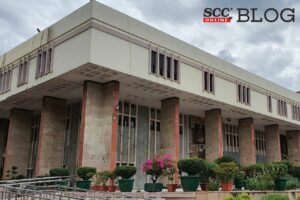Delhi High Court: Expressing that, Minor mistakes of inconsequential importance are insufficient to seek a review, Asha Menon, J., elaborated that, while seeking review of orders passed in a Civil Suit, the grounds mentioned in Order XLVII Rule 1 of the CPC have to be satisfied, which would not equate the hearing with the original hearing of the case or a hearing in an appeal.
A review petition was filed wherein the petitioners/defendant submitted that order of the Court dated 7-1-2022 allowing in part the application moved by the respondent/plaintiff under Order XI Rules 2 and 14 of the Code of Civil Procedure, 1907 was liable to be reviewed, as erroneous directions were issued on the basis of an erroneous understanding of the facts of the matter.
Petitioners/defendants were gravely aggrieved by the directions issued by this Court to produce their third-party agreements, since the findings on the basis of which, the directions were issued, were contrary to the submission made by the parties.
Analysis, Law and Discussion
“Scope of a review is extremely limited.”
The errors raised by the petitioners/defendants required the Court to delve into the materials, apply its mind afresh after re-evaluating the materials and further, decide the application.
Bench found the Senior Counsel’s submission to be right, that such a course of action as stated above would be relevant in an appeal.
“An error which is not self-evident and has to be detected by a process of reasoning cannot be described as an error apparent on the face of the record, justifying the court exercising its power of review.”
High Court also observed that, fresh and additional material cannot be pressed into service to seek a review of an order.
The Bench added that the normal principle is that what is pronounced by the Court is final, else, there must be some manifest wrong caused leading to miscarriage of justice.
Settled Law
A review can by no means be an appeal in disguise where an erroneous decision is reheard and corrected, as has been sought to be urged in the present matter.
Review or Appeal?
High Court noted that the emphasis had been on the erroneous understanding of the pleadings of the parties which resulted in erroneous conclusions, hence rehearing was not possible to correct all the said “errors”.
Adding to the above, Court stated that “Error” has to be an error apparent on the face of the record to attract the provisions of Order XLVII Rule 1 of the CPC and must be a patent error which alone can be looked into in review proceedings.
High Court also reiterated the summary of principles governing review petitions as laid down in Kamlesh Verma v. Mayawati, (2013) 8 SCC 320.
Considering the above-stated decision, Bench held that no interference was needed for exercising review jurisdiction.
Therefore, in view of the above discussion, the review petition was dismissed. [Koninklijke Philips N.V. v. Vivo Mobile Communication Co. Ltd., 2022 SCC OnLine Del 470, decided on 15-2-2022]
Advocates before the Court:
For the Plaintiff:
Chander Lall, Senior Advocate with Ashutosh Kumar, Swamil Dey, Vrinda Bagaria, Munesh Sharma, Vinod Chauhan and Ananya Chugh, Advocates
For the Defendants:
Saikrishna Rajagopal, Julien George, Anu Paarcha, Arjun Gadhoke, Avijit Kumar, Aniruddh Bhatia, Skanda Shekhar, N. Parvati & Vivek Ayyagari, Advocates for D-1 & D-2
Nupur Aggarwal & Maanav Kumar, Advocates for D-3

